Not the George Galloway political party (thankfully), nor the excellent charity combatting domestic violence, but human rights in the widest sense, the respect accorded for every individual by every other individual, their government and all groups operating within that jurisdiction.
In short, respect as a mark of a civilised society, that which underpins our civility. Within our Welfare Society, that certainly means caring without fear or favour for the aged, the sick, the disabled, those who suffer poverty, who cannot find work, who are struggling for many reasons – in other words, those least able to cope. However, an alien visiting now may consider that tolerance of those less fortunate than others is wearing very thin.
But first a few definitions, starting with the relevant types of “respect” courtesy of theFreeDictionary.com:
re·spect (r
-sp
kt
)
tr.v.
1. To feel or show deferential regard for; esteem.2. To avoid violation of or interference with: respect the speed limit.3. To relate or refer to; concern.n.1. A feeling of appreciative, often deferential regard; esteem.2. The state of being regarded with honour or esteem.3. Willingness to show consideration or appreciation.4. respects Polite expressions of consideration or deference: pay one’s respects.
To me it means especially empathy – thinking of the needs and wishes of others before your own selfish interests.
The fundamental nature of respect is as the clichés tell it: “you have to respect yourself before you can respect others” and “respect must be earned, not given” for two. Courtesy of Wikipedia:
Respect is a positive feeling of esteem or deference for a person or other entity (such as a nation or a religion), and also specific actions and conduct representative of that esteem. Respect can be a specific feeling of regard for the actual qualities of the one respected (e.g. “I have great respect for her judgment”). It can also be conduct in accord with a specific ethic of respect. Rude conduct is usually considered to indicate a lack of respect, disrespect, where as actions that honor somebody or something indicate respect. Specific ethics of respect are of fundamental importance to various cultures. Respect for tradition and legitimate authority is identified by Jonathan Haidt, a professor at the University of New York Sten School of Business, as one of five fundamental moral values shared to a greater or lesser degree by different societies and individuals.
Respect is both given and received. We expect other people to respect us in return for the respect we show them. Respect is also something that is earned by the standards of the particular society in which one lives. Respect cannot be measured as a quantity, cannot be bought or traded, it is one of those things that is earned and built over time, but that can be lost with one stupid or inconsiderate act. One can ask or beg for respect, but only others can bestow us with respect as a result of their perceived treatment by us. Continued caring interactions are then required to maintain or increase that original earned respect.
And another cliché is also true here – perception is reality. A little respect goes a long way and is mostly appreciated, though that should not be why we give it. However, the moral principles are worth applying since the inevitable result of giving respect is to be treated with the same or greater respect. The greater your generosity of spirit, the more that spirit will be returned to you. In other words, it is in your interests to be kind, thoughtful and deferential towards your fellow human beings.
Others in society, people that have important roles on a way that a person lives on a day-to-day basis, earn the respect of individuals by assisting others. For example, all individuals have the right to be respected by others until they prove otherwise. Simple words and phrases like, “Thank you,” in the West and simple mechanisms like a slight bow in the East, such as a smile or direct eye contact, show a level of respect that over time will form, within a culture, a cohesive bond.
Respect transcends language and cultural barriers and comes from the very heartbeat of our humanity, since we then recognise another human being to be our equal and deserving of our humility. Maybe the reason some choose not to extend courtesy is because they believe in their own inherent superiority, which is both a vain and arrogant attitude, and is much more likely to result in respect not being extended to us when we need it.
Respect cannot always be seen or observed by actions, but for those who practice chivalry, the outward display of respect is refreshing. Some women view this as patronizing and demeaning, but in its pure form chivalry is about nearly absolute respect.
On that last point, I believe in holding a door open for anybody, male or female. It is a common courtesy we should always extend, whether or not anybody else does the same for us. Equally, I believe in courtesy in road use, allowing people right of way, moving over for faster traffic and never indulging in road rage – though there must be scarcely a driver around who has not found themselves stressed by the behaviour of other road users on occasion!
Respect should not be confused with tolerance, since tolerance doesn’t necessarily imply subordination to one’s qualities but means treating as equal.
I don’t necessarily agree that tolerance means treating as an equal, though you can be tolerant without showing huge respect. If I tolerate your beliefs I am putting up with them, according you the right to freedom of speech in the same way that the quote often attributed to Voltaire declares “I disagree with what you say but defend to the death your right to say it.”
Respect means that you accord due value to the other person, regardless of beliefs. For example, I have a good friend who is a Baptist minister, where I am an atheist. I don’t agree with her Christian beliefs at all, and if we debated them we would end up agreeing to differ, though we would not fall out. However, we would respect one another, not only our respective right to hold those beliefs but respect for the people we are. She is without question one of the most compassionate and selfless people I ever met, for which my respect is boundless.
And while we’re on the subject of respect, broadening it out to include “human rights“seems eminently sensible, since to me they encapsulate the nature of respect within or between societies, taking the term to mean either simply the:
“commonly understood as inalienable fundamental rights to which a person is inherently entitled simply because she or he is a human being”
“freedom and right to a dignified life…”
…or for completeness is fully codified in the UN’s Universal Declaration of Human Rights, to which great lip service is paid and which, in the words of Hamlet, is often observed more often in the breach than in the observance.
Why should this be? Why are people inherently cruel and disrespectful towards others, particularly those whose appearance and culture are different to our own? The answer may simply be that we are an inherently selfish and often ruthless species, but from a Darwinian perspective does that help the fittest survive? I’d argue against that contention. Mutual respect is a matter of survival, particularly in an age where disrespect and lack of understanding causes death and war.
One thought: I mentioned at the top how our treatment of those less fortunate than ourselves is a measure of the respect within a civilised society, but I would also argue that how we treat and respect the human rights of those we are punishing is also relevant, which is to say I don’t think we should dehumanise them on the basis of their crimes, but to demonstrate the importance of respect, recognising the terrible wrong they have done to their victims, and giving them at least an opportunity for redemption and recompense to the people they wrong, or at least to their families.
This week I participated in a Facebook debate about Ian Brady and his current attempt to have himself certified sane so he could return to an ordinary prison so he can refuse food and die rather than being force-fed at a secure hospital.
Watching the details of Ian Brady’s crimes on t.v. this morning….makes me wonder why he was never hanged all those years ago….terrible case….
I’m not defending Ian Brady or the appalling crimes he committed for one moment, though I do believe strongly that if we do regard ourselves as civilised we must extend the principles of respect to the human rights of everyone? While it is not the place of the law to recompense victims of crime, removing humanity from Brady will not bring back the people he murdered.
The USA often adopts the moral high ground in issues of human rights in China and Saudi Arabia, to name but two, but retains the detention camp in Guantanamo Bay in spite of repeated declarations from President Obama that it would be shut – and universal condemnation of concentration camps, which is precisely what Guantanamo Bay has become. As of March 2013 166 detainees remain at Camp Delta, all but 6 held without charges. However:
On 12 June 2008, the United States Supreme Court ruled in Boumediene v. Bush that the Guantánamo captives were entitled to the protection of the United States Constitution. Justice Anthony Kennedy, writing for the majority, described the SCR Tribunals as “an inadequate substitute for habeas corpus” although “both the DTA and the SCRT process remain intact.” On 21 October 2008, United States district court Judge Richard J. Leon ordered the release of the five Algerians held at Guantánamo Bay, Cuba, and the continued detention of a sixth, Bensayah Belkacem. The Court ruled: “To allow enemy combatancy to rest on so thin a reed would be inconsistent with this court’s obligation; the court must and will grant their petitions and order their release.” In the aftermath of the Boumediene v. Bush decision a series of appeals court rulings since July 2010 have made it increasingly difficult for Guantánamo detainees to win their habeas corpus cases
Torture has often been said to take place at Guantanamo, though this is denied – indeed the USA claims “water-boarding” or simulated drowning to be a legitimate technique for interrogation.
As for the camp, the figures speak for themselves:
779 – Total number of detainees who have been held at the Guantanamo Bay facility since September 11, 2001 attacks.600 – Of the 779 detainees, roughly 600 were released without charges, many after being detained for years.166 – Total number of detainees remaining at Guantanamo.86 – Number of the 166 detainees who the US has approved for transfer to home or third countries but remain at Guantanamo.9 – Number of Guantanamo detainees who died while in custody, six by suspected suicide.7 – Number of those convicted in the military commissions after trial or plea bargain.6 – Of the 166 detainees that remain at Guantanamo only six, Abd al-Rahim al-Nashiri, and the September 11, 2001 co-defendants face any formal charges.
To my mind this indicates clearly that the suspects are considered by the USA, bastion of democracy, to be sub-human and to be deserving of no respect whatever, even when found to be innocent of any crime.
Would we accept this treatment in our own country to our own citizens, no matter what crime they were suspected of having committed? Absolutely not! So forget the special status accorded “the war on terror” – people should be charged and tried freely and fairly assuming there is evidence to link them with criminal charges in the jurisdiction concerned. If they are convicted, they should be jailed in accordance with the penal code of that location, and if acquitted they should be released without delay.
The American message to the world on human rights is clear: “do as we say, not as we do” – and in this case the world is expected to accept the people concerned to be prisoners of war, to be held in detention permanently and without mercy, let alone respect. If you treat people as below any dignity, you are as bad as they are, maybe worse.
If the world is disdainful of the American right to the high ground and to spread the gospel of peace, freedom and democracy, this is why: you have to practice what you preach. To me respect of human rights is indivisible – either you apply it or you don’t, and in the American case my view is that human rights are not respected in the lust for retribution.
This is one example, chosen because of the hypocrisy of American attitudes, even though these are rationalised. Fact of the matter is that many governments in many countries around the world accord their citizens with little or no respect. Life is cheap and human rights expendable if there is deemed a security risk.
If we as homo sapiens wish to prolong our reign as guardians and protectors of our earth and the future of our species, we must surely begin by enshrining respect as the most important commodity, above all differences between us – the point being that that is the way to achieve win:win. Without respect, the weaker party will always lose.

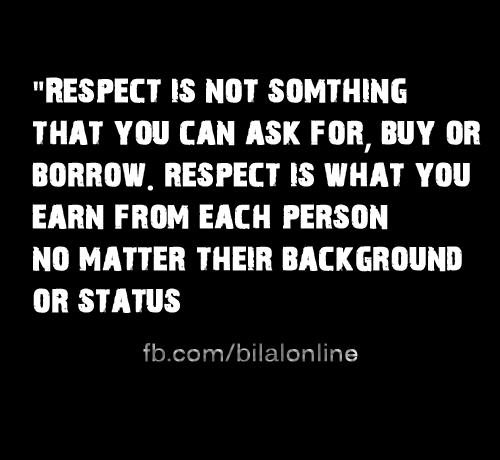

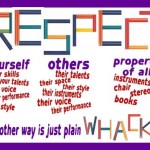
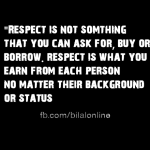
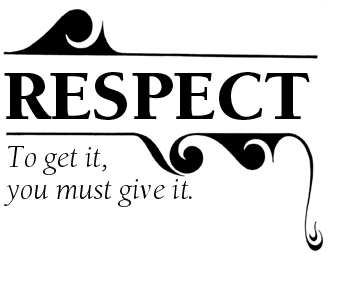

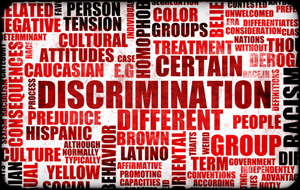
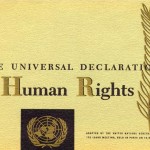

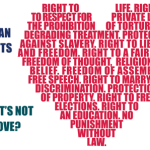

Well…respect has to be earnt…Ian Brady should have NO rights…none.
I respect your opinion, and respectfully disagree
If more people were as fair minded & empathetic as you Andy, the world would be a much better place. Thanks for another great piece of writing.
Thank you kindly :). Do you write at all, JA?